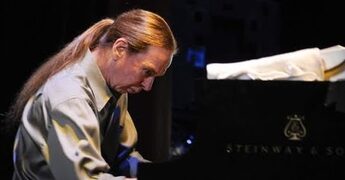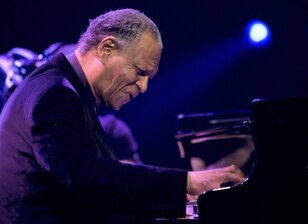
Only last year, Jazz journalist CJ Stearn from New York City had interviewed me for his Jazz Talk program and we spend a good deal of the two-hour discussion about Lyle Mays and his work with Pat Metheny. Lyle was a longtime collaborator with Metheny. He was an innovative keyboard player whose expansive textures and touching solos on grand piano provided a key element of the Pat Metheny sound. Indeed, he was a cornerstone to that sound. Mays was also co-composer of many the Pat Metheny Group anthems for four decades.
A Wisconsin NativeLyle was a native of Wausaukee, Wisconsin. He studied Jazz at North Texas State University when it, along with the University of Miami, was accounted as the best Jazz schools in the country. He played for the North Texas State University Lab Band and was composer-arranger of the Grammy-nominated album Lab 75. In fact, a friend of mine’s son is studying Jazz at University of North Texas (as it is now called) and said that they are still performing the charts created by Lyle 45 years ago.
Lyle later toured with Woody Herman’s Orchestra for eight months (1975-1976). Then he met Pat Metheny.
Lyle Meets Pat MethenyThey first met at the Wichita Jazz Festival in 1975 and Lyle later appeared on the Metheny’s 1977 album, Watercolors.
I had come to Jazz through the 1975 Keith Jarrett album, the Köln Concert. I grabbed all the Jarrett albums I could and was—and still am—hooked on piano Jazz. But through my growing familiarity with Jarrett, I came to know many other Jazz artists with whom he performed and recorded and then who recorded with them and so on. It led me to an album by a guitarist named Pat Metheny (who had attended University of Miami) called Bright Size Life. It was a trio album with the great Jaco Pastorius on bass and Bob Moses on drums. I enjoyed the album a lot but there were no keyboards on that album. That was 1976.
The next year brought the release of Watercolors with Metheny on guitar, the amazing Eberhard Weber on bass, the equally amazing Danny Gottlieb on drums and a kid named Lyle Mays on piano and keyboards. Lyle became the reason that I stayed a fan of the Pat Metheny bands for so many years. I saw Pat Metheny in concert four times from 1979 through 1990 and I went in order to see Lyle.
Lyle contributed as a player and co-composer to a remarkably productive string of Pat Metheny Group albums, including 1978’s Pat Metheny Group, 1979’s American Garage, 1981’s Off Ramp, 1983’s Travels, 1984’s First Circle, 1987’s Still Life (Talking), 1989’s Letter From Home, 1992’s Secret Story (although Lyle is rarely present), 1993’s The Road To You, 1994’s We Live Here, 1996’s Quartet, 1997’s Imaginary Day, 2002’s Speaking of Now and culminating with 2005’s The Way Up, a sprawling through-composed jazz tone poem co-written by Mays and Metheny divided into four sections. Mays and Metheny also lent their trademark sound to the sweeping soundtrack to the 1984 film The Falcon and the Snowman, which featured David Bowie’s vocals on “This Is Not America.”
Contributions to the Pat Metheny GroupWith Lyle on keyboards, especially on piano, the group’s sound became joyful but reverent. On the 1980 album As Falls Wichita, So Falls Wichita Falls, the song September 15 was dedicated to the inimitable Jazz pianist Bill Evans who had died on September 15, 1980. It was the best thing I had ever heard. It was sweet and sad and to this day I still am moved beyond words by the beauty of that piece.
But in 1984, the Pat Metheny Group released the album First Circle. That album contained a track called Praise. Pedro Aznarprovided wordless vocals overtop the exquisite keyboards of Lyle and the beautiful guitar of Metheny. I think I wore out three copies of that vinyl record.
Meeting LyleAs it worked out, I got to tell Lyle that myself in 1984 just before their concert in Waco, Texas. I was living there at the time and I knew a guy who worked at the concert hall. I convinced him (okay, I gave him $20) to let me in to see the soundcheck before the show. I got to meet Lyle who—despite the stories of him being so reclusive—was incredibly friendly. I realized that he was only five years older than me and told him of my admiration for September 15 and Praise. I even said that Praise was a song that I wished would never end. He smiled and said, “Well, I see what I can do.”
That night, they performed most of the songs from the First Circle album and more but…no Praise. They left the stage and I was extremely disappointed. I thought, “Well, maybe I’m the only one who likes it.” Then, with the standing ovation still in progress, the band returned to the stage for an encore. Metheny walked up to the microphone and said, “We usually play American Garage for our encore but Lyle wanted to save the encore for this one.” I wish we had iPhones in those days so I could have recorded it.
They started on the first chord and I—and everyone else—knew that it was Praise. That song is 4:19 on the album but, that night, it went on for over 10 minutes. When I thought they were closing out the song, Lyle circled his finger over his head and the vamping began. They played off each other incredibly and I had the time of my young life.
Lyle as Leader and Solo ArtistLyle didn’t record much as a leader, beginning with his self-titled 1985 debut and continuing with 1988’s Street Dreams, 1992’s Fictionary and 2000’s Solo: Improvisations for Expanded Piano. He was a member of the celebrated band on Joni Mitchell’s Shadows and Light tour in 1979 that included Metheny, Jaco Pastorius, Michael Brecker and Don Alias. He won 11 Grammys and was nominated 23 times. In 2016, he was inducted into the Wisconsin Area Music Industry’s Hall of Fame.
Reactions to Lyle's PassingPat Metheny posted on his website the day Lyle passed, “Lyle was one of the greatest musicians I have ever known. Across more than 30 years, every moment we shared in music was special. From the first notes we played together, we had an immediate bond. His broad intelligence and musical wisdom informed every aspect of who he was in every way. I will miss him with all my heart.”
Steve Rodby, who joined as bassist and producer for the Pat Metheny Group in 1980, also issued a statement on Metheny’s Facebook page: “I had the great privilege of having Lyle in my life for decades, as an inspiration and as my friend. As anyone who knew him and his music will agree, there will only be one Lyle, and we all will continue to appreciate his soulful brilliance, in so many ways.”
On Thursday, Metheny expanded on his thoughts of Lyle: “There was a valuable lesson I learned early on from my most important mentor, Gary Burton; when you start a group, you have an obligation to choose the best musicians you can possibly find. And then, if you are lucky, once you have great people in place, you have an even more important obligation; to create an environment for them to do their very best.
“The mandate of the bandleader as I understood it from Gary, (and I believe he understood it from Stan Getz who got it from —… who got it from —…ad infinitum) was to offer the most talented players every opportunity to develop the things that they are most interested to the highest degree possible under your auspices; to create a platform that intersects with what your goals are as a leader, but also a zone that provides a world open to exploration and expansion for everyone. When the moment comes that that intersection is no longer in sight for either side of the equation, that is when it is time to make a change.
“With Lyle, as with Steve Rodby, that moment never came. There was always plenty to talk about. In fact, it seemed infinite…
“As I wrote earlier. I will miss him with all my heart.
In addition to everything else; Lyle, Steve, and I were friends for going on half a century, and together we shared many of the ups-and-downs of our lives together here on the planet, on and off the bandstand. I am most grateful for that above all.”
I had hoped that someday we could get Lyle Mays to the Central Wisconsin Jazz Festival. And even though we will never get to hear more from him, we are blessed that we have such a wealth of recordings that can be summoned for our pleasure and edification whenever we want.
Thanks for all of it, Lyle.

 RSS Feed
RSS Feed
